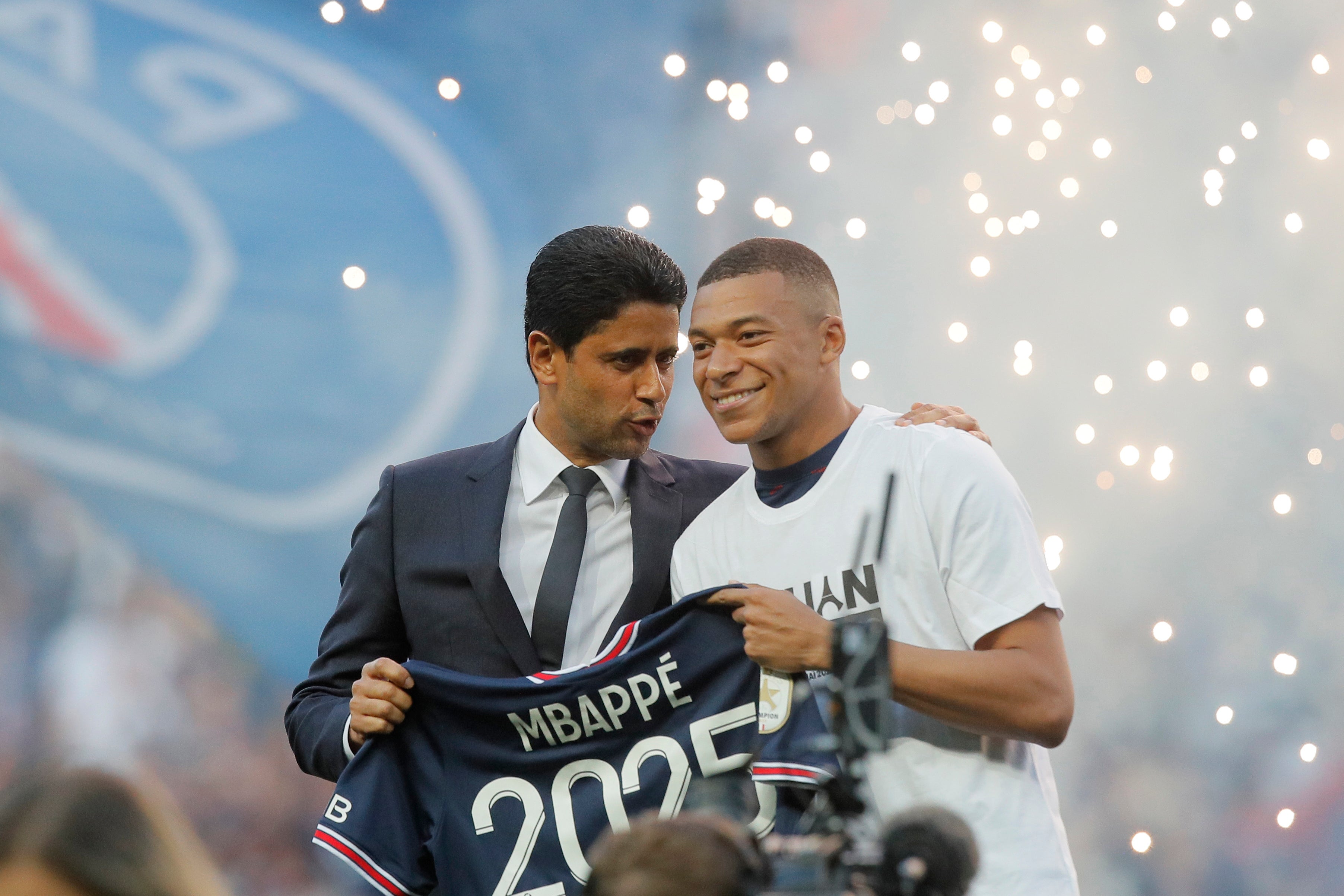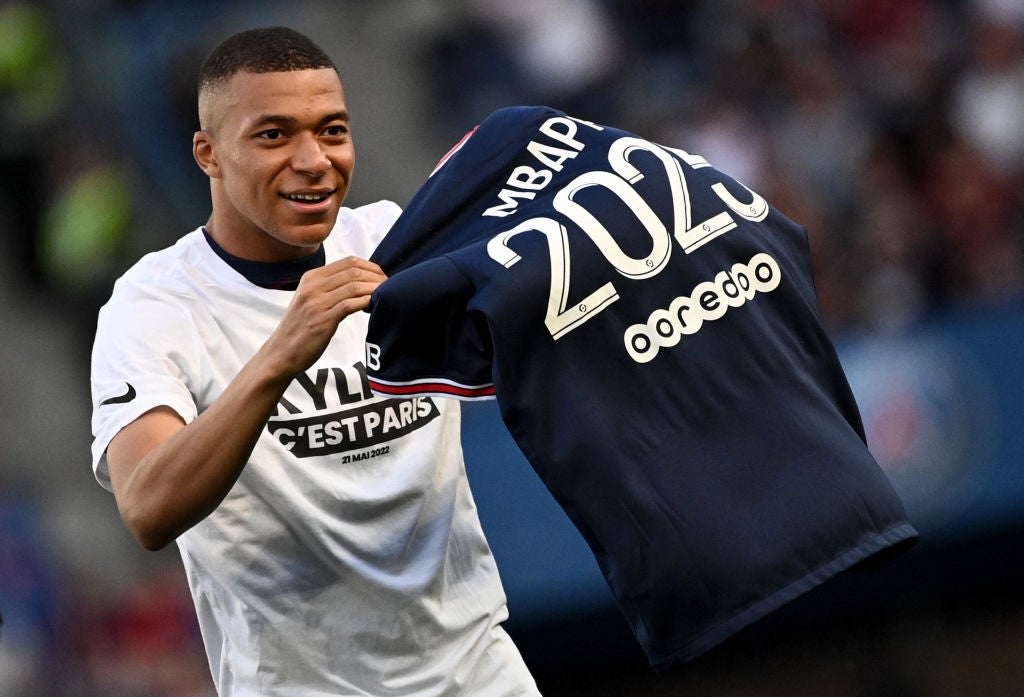The Kylian Mbappe saga and how football became a plaything for nation states
Football has never been more in need of visionary leaders, because the vision for the game is becoming increasingly grim

Your support helps us to tell the story
From reproductive rights to climate change to Big Tech, The Independent is on the ground when the story is developing. Whether it's investigating the financials of Elon Musk's pro-Trump PAC or producing our latest documentary, 'The A Word', which shines a light on the American women fighting for reproductive rights, we know how important it is to parse out the facts from the messaging.
At such a critical moment in US history, we need reporters on the ground. Your donation allows us to keep sending journalists to speak to both sides of the story.
The Independent is trusted by Americans across the entire political spectrum. And unlike many other quality news outlets, we choose not to lock Americans out of our reporting and analysis with paywalls. We believe quality journalism should be available to everyone, paid for by those who can afford it.
Your support makes all the difference.In order to understand some of the rationale behind Kylian Mbappe’s stunning announcement that he will stay at PSG, you only have to consider where he’s been for the last week. That was in Qatar with Paris Saint-Germain, where he was given the hard sell. It was obviously persuasive. It is how the situation went from an “imminent” move to Madrid on Monday to Mbappe Whatsapping Florentino Perez his decision on Saturday.
This is the sort of influence a state can bring to bear. There’s then the money a state can bring to bear.
PSG have been insisting that their offer to Mbappe was actually less than Real Madrid’s, and he will be the best-paid player in the world on “only” €40m a year. The Independent has been told by connected sources it is “close to double that”.
Perez, who for so long revelled in Real Madrid being able to afford more than anyone else, has been given a taste of his own medicine. Madrid were just blown out of the water, having had to totally restructure their own wage bill to make this happen. The image of Perez railing about this like Logan Roy is undeniably a funny one, and sources say he is “fuming”, not least with the manner he was informed.
Madrid, like Manchester United and so many other major clubs, are really suffering the inevitable end product from the hyper-capitalist football world they were instrumental in creating. It is Frankenstein’s monster, and it has now come back to trample on them. They are not blameless, and there shouldn’t be that much sympathy.
Any schadenfreude about that does not mean this is something we should be happy about. This is a landmark moment for football, and a concerning one. The two next best players in the world, Mbappe and Erling Haaland, have now signed on for sportswashing projects. Some traditional powers attempted to go for them, but found they just couldn’t make the finances work. The writing has long been on the wall.
These are not mere market forces at work, in the problematic way that has been generally true for a lot of football’s modern history. It is even more concerted than that.
As long ago as 2017, and the Neymar transfer, The Independent reported that one of PSG’s aims was to raise fees and wages to such a height that only a handful of clubs could compete. A potential bonus of this would have been traditional powers bringing themselves to ruin in trying to keep up.
This is precisely what is happening. We are entering a world where only clubs with state backing – and maybe one or two commercial giants like Manchester United – can financially compete.
This, put bluntly, is anti-sport, especially since the entire foundational idea of sport is competitive balance and the unpredictability that comes from the very principle of “a match”.
It should be stressed that this is not an argument for the old powers to rule again. It's that we are now so far away from the competitive variety that football should be about, that did genuinely exist until at least the 1980s.
It is also why, for all the obvious complaints about La Liga president Javier Tebas’s politics, the Spanish competition’s sensational statement – describing Mbappe’s contract as “scandalous” – had plenty of merit.

It is all the more remarkable given the politics at play here.
A mistaken belief has been that La Liga has done this because it won’t see a megastar join, and that it is aggravated on Madrid’s behalf. Nothing could be further from the truth. La Liga has long been striving to bring the big two – Real Madrid and Barcelona – under financial control to increase competitive balance, enforcing very strict economic rules. It was a situation that led to the competition losing its greatest ever star in Lionel Messi, and helped create a deep schism between Tebas and the historically unprecedented pairing of Madrid and Barcelona.
Tebas might be wrong on many of his personal politics, but he is absolutely right on the idea of competitive balance in European football and it is this that primarily drives his response. He has been consistent on it.
That is not something that you can say for the current Uefa hierarchy. How do you go from decrying the Super League to a situation that sees this? Many might of course point to the new power that PSG and Nasser Al-Khelaifi accrued in the wake of that failed plot.
Either way, Uefa’s primary role is supposed to be safeguarding the health of the sport. It is hard to see how this is happening in a world entirely conditioned by a handful of state projects being able to spend what they want. That is not remedying inequality, or “rebalancing” the game, as some arguments have had it. It is making that inequality worse, and ensuring the top end of the sport is even narrower. Madrid and La Liga have had another reality check, reminded that neither are the place to be any more.
Football has never been more in need of visionary leaders, because the vision for the game is becoming increasingly grim. The top end, the level with the most prestige, is now so visibly a plaything for nation states with hugely problematic human rights records.
Is that really what sport is about? Is that we want from our game?
As for what Mbappe wants, it is difficult not to question the decision. If Perez were Garry Cook, he might even accuse Mbappe of “bottling it” – as the former Manchester City executive did with Kaka. There is the lingering sense of the French star staying in a comfortable league, and a club situation that is now beyond comfortable given the influence he is accruing. This will meanwhile only increase PSG’s galling superiority over the French league. Will many even be watching another procession? It is not really a player pushing his limits, although the challenge is now to finally deliver that Champions League for PSG.
That quest has remained a source of comedy for the game in its own right. It’s still hard not to think there’s an inevitability about it, though. They and City will eventually win it. They’re just pouring too much money in. That is how the modern game really works.
Join our commenting forum
Join thought-provoking conversations, follow other Independent readers and see their replies
Comments